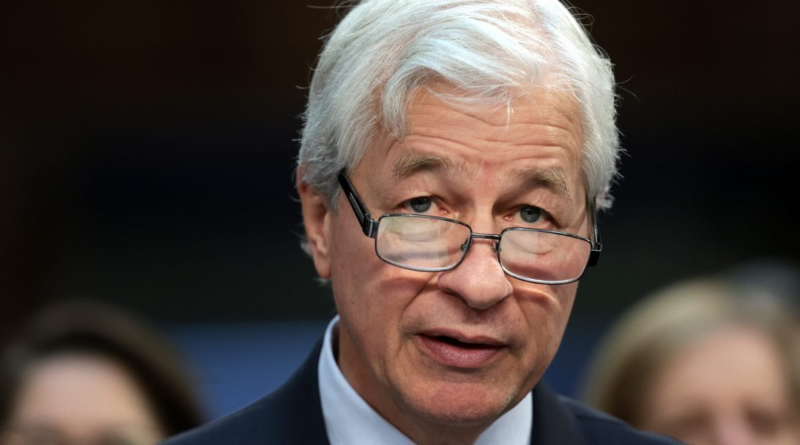Jamie Dimon says San Francisco is in 'far worse shape' than New York—and the data agrees
San Francisco’s reputation just took another shot, with yet again a renowned business leader piling on to criticize the city. “San Francisco is in far worse shape than New York,” JPMorgan Chase CEO Jamie Dimon told Maria Bartiromo in an interview on Fox Business, while in San Francisco for the company’s annual Healthcare Conference.
“I think every city, like every country, should be thinking about what makes an attractive city,” Dimon says. “It’s parks, it’s art, but it’s definitely safety, it’s jobs and job creation, it’s the ability to have affordable housing. Any city that doesn’t do a good job will lose its population.”
To help solve the problems facing San Francisco, Dimon believes “government’s got to listen to business,” and blasted the city by the bay for a litany of failings, while praising the Big Apple and in particular its Mayor Eric Adams. “I think he’s doing the right stuff on crime,” Dimon said. He added that he and the mayor have a good rapport, if not quite a full working relationship. “This mayor is actively engaged,” Dimon says. “He’s reaching out. We’ve had lunch a couple of times.”
The data backs up some of Dimon’s claims. The crime rate is higher in San Francisco than in New York, according to bestplaces.net, which uses FBI data to create an index for violent and property crimes. It assigned San Francisco a violent crime index of 39.6 compared to New York’s 28.2, with both above the national index figure of 22.7. Property crime in San Francisco was an even great disparity, with San Francisco assigned a 79.2 index figure compared to New York’s 24.9, which actually came in below the national average of 35.4.
The New York City public does not share Dimon’s approval for Adams’ performance, though, as the mayor (famously a former New York City cop himself, as well as a teenage victim of police brutality), faces an approval rating of just 28%, the lowest for a Gotham mayor since 1996. Adams is also battling a myriad of legal challenges. The FBI seized his phones cell phones as part of a federal investigation and he is being accused of a sexual assault dating back to 1993. San Francisco Mayor London Breed isn’t faring much better with her voters, with a poll from June showing 66% of voters disapproved of her performance, citing exactly the issues Dimon mentioned, crime, safety—and housing.
The Bay Area’s housing crisis
Dimon urged businesses to help San Francisco address the affordable housing crisis plaguing the city. With no affordable homes, Dimon says, companies wouldn’t be able to hire employees because they’d have nowhere to live.
“Some of these great companies here, if they can grow jobs here, it’s great for the city,” Dimon said of San Francisco. “But they need housing. If they can’t get the permits to build affordable housing, they can’t build a new [office] building here and bring in high paid employees.”
Both cities have long been battling an affordable housing crisis, so it’s not as if New York can brag about its record here. New York ranks as the most expensive housing market in the country, with San Francisco not far behind in third place. But it’s a virtual tie, in terms of rent, with the average rent in New York at $3,375 compared to $3,300 in San Francisco, according to Zillow. Still, this is a reversal from before the pandemic, when San Francisco claimed the title of least affordable nationwide.
Many of the biggest Bay Area tech companies, including Alphabet and Meta, have tried to tackle the housing problem themselves by building homes that would be available to anyone, not just company employees. Alphabet, for instance, agreed on a plan with the city council of Mountain View, Calif., where its headquarters are located, to build almost 10,000 homes in 2017. But last year, the developer, Lendlease, walked away from the project and two other Google-backed developments because it was “no longer mutually beneficial given current market conditions.”
In October, San Francisco passed a law meant to induce landlords and developers to build more housing. The law would impose a steep tax on owners of multifamily homes who left them sitting empty. In theory, doing so should push developers to build homes and therefore increase the supply of homes, which can be particularly scant in urban areas.
Empty offices portend a ‘doom loop’
Dimon’s comments—and San Francisco’s struggles—come against the backdrop of the much-feared doom loop, when the core industry of a city suffers a major shock that causes job losses and employee flight. This sparks a vicious cycle as tax revenues fall, city services decline, and the city attracts fewer new residents, worsening the problem until downtowns are completely hollowed out.
Looking at office vacancies as a proxy for downtown district health, San Francisco has a historic number of vacancies. In the fourth quarter of 2023, San Francisco hit a vacancy rate of 35.6%, according to real estate firm CBRE. It’s a record high, the San Francisco Examiner reported, adding that CBRE forecasts a peak sometime in 2024 and offices to start filling up again.
In New York, Adams has been a fierce if not completely successful advocate of ending remote work and returning workers to their offices. In February 2022, he said some of those using COVID as a reason to work from home were doing so in bad faith. “You can’t tell me you’re afraid of COVID on Monday and I see you in a nightclub on Sunday,” he said during a speech at the state Democratic Committee’s Nominating Convention. Despite his efforts Adams also faces an unprecedented situation with a record high 17% of offices vacant in the fourth quarter of 2023, according to real estate firm JLL.
Adams even prodded Dimon, a fellow remote work critic, to set an example for his employees, which he had asked to return to the office by taking the subway to work. “He understands the need of getting his people back and leading from the front,” Adams said, referring to Dimon.
Adams is also taking tentative steps in exactly the direction Dimon suggested. In August, Adams presented a plan that would rewrite zoning laws so that some empty office buildings could be turned into housing. “We know New Yorkers are struggling, you hear it all the time, every elected [official] in this city, the number one thing they hear is housing, housing, housing,” Adams said at a news conference at the time. Projected to add 100,000 units over 15 years, it’s a drop in the bucket for a city of 8.5 million, but it may be a start.
Dimon may therefore be correct that San Francisco is “in far worse shape” than New York, but both cities continue to struggle with soaring rents and empty offices. Dimon was clear with Bartiromo about one solution that big businesses should definitely avoid: taxes. “They think they’re just going to tax more and more,” Dimon said. “It doesn’t work.” After all, that way lies the doom loop.




